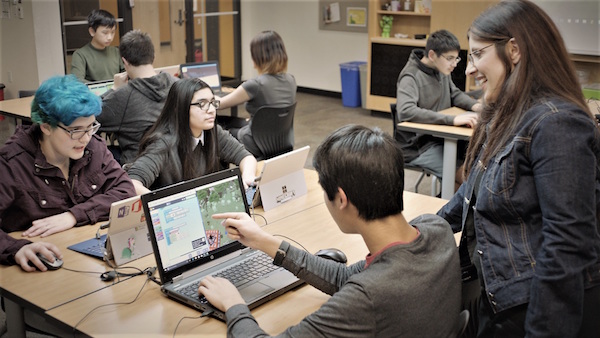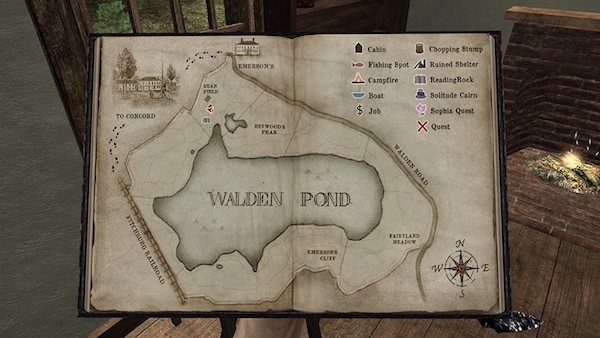
BY CHARLES BATTERSBY | Rescuing the princess is a mainstay of video games, but some developers are out to do more than save a fictional damsel. They want to save the real world. For the 14th year, the Games For Change Festival (G4C) will gather together game designers, researchers, and humanitarians to explore how video games can be used for positive impact. The three-day summit (July 31–Aug. 2) will focus on health, social impact, and education, with a full day devoted to Virtual Reality.
We spoke with Susanna Pollack the president of G4C, about the different programming tracks that attendees will find at the festival. Pollack described the Civics & Social Issues track as “the heart of what Games For Change has been since the beginning — talking about socio-cultural, political, emotional, personal experiences, and how that’s expressed through games.”
One of the games featured in the Civics & Social Issues track is “Walden, a Game,” which is based on Henry David Thoreau’s book “Walden.” Its designer, Tracy Fullerton, told us, “Thoreau’s themes are even more topical now than they were when he was writing them. His book is a call to action for reflecting on our lives and society, how we live and what we value. For him, living simply and consciously was an answer; a kind of active life of reflection and deliberate choice. I think that in this way, it is a perfect example of a game for change: changing our way of thinking and living.”
Fullerton will also deliver a Keynote speech about designing games that explore the arts and humanities. “So many games are about conquest, winning, losing, a kind of binary approach to existence,” she noted. “I want to talk about the gray areas of experience that the arts and humanities allow us to focus on. We need more experience parsing these gray areas, and while games that model more simplistic questions are fun and engaging, I am calling for games that don’t give simple answers but rather open in more complex, layered questions about life.”
Another line of programming in festival is the Games For Learning Summit, which focuses on educational games. Featured prominently this year is “Minecraft: Education Edition.” Kids have learned to fear the phrase “It makes learning fun” — but “Minecraft” has an edge in that it’s already a massively popular franchise.
Meenoo Rami, manager at “Minecraft: Education Edition,” explained, “I think what makes ‘Minecraft’ unique is that it allows teachers to use an environment students already know and love, and build on it with learning experiences that are richer and richer.”
We asked Rami about how this game fits with the festival’s ambitions, and she said, “Games For Change is about innovation, aligning with ‘Minecraft: Education Edition,’ which promotes creativity, collaboration, and problem solving, meeting students where they are in a fun and familiar environment.”
Rami said they’ve “found a lot of support in the educator community and more importantly, we are turning to them to help us shape the road map for our work,” and noted that kids’ “love and excitement is palpable. If teachers tap into this enthusiasm and expertise and combine it with their own know-how of designing learning experiences, you have a winning combination in the classroom.”

For years, the game industry has claimed that some games are good for your health, or that they keep your brain in shape through puzzle-solving. Last year the festival added a new track to examine these ideas with a more clinical eye. The Neurogaming & Health program returns this year with panels that discus and debate the realities of games and their relationship to health and “brain training.”
New to the festival this year is a full day set aside for Virtual Reality, with the VR For Change Summit. According to Pollack, “It’s time to call that out as a medium that has a lot of impact potential, and also to expand the type of experiences that creators are making beyond just games. … We’re going to have a whole day focused on the opportunities and challenges of VR.”
The festival isn’t just for gamers and tech enthusiasts. The roster of speakers and panelists includes many who are from the scientific and political fields. “What’s bringing people together is the potential that games have to help further their work,” Pollack said. “A lot of the speakers that you’ll find at the festival are talking about a high level overview of the potential that games have, why they’re relevant, how amazing projects have been born using this medium, that is enlightening people or educating people, helping them gain a little awareness about an issue. … It’s as much about the content that the games are about, as it is about the technology and the processes of making a game.”

The festival still seeks to draw in hardcore gamers, and traditional game designers. “We’re hoping to inspire those gamers or game developers who are more focused on commercial, entertainment properties, and bringing them into the space,” Pollack said, noting G4C provides a space “to explore and find amazing games that they can play, that are high quality and completely engaging, that might offer a different experience.” Of particular interest to New York’s game design community are several panels on funding sources for games that have educational or research value.
People who can’t make it to the festival in person can still see the panels from this year’s festival and previous years, on the festival’s YouTube channel. G4C is also hosting a series of live “Talk And Play” events in New York City later this fall. Kids who are in public school will also be able to participate in making their own games with the festival’s Student Challenge event in the coming school year.
Mon., July 31 through Wed., Aug. 2. At the Parsons School of Design at The New School (66 Fifth Ave., btw. Fifth & Sixth Aves.). Festival passes for individual days or entire event range from $179—$499 (nonprofit/educator and group discounts available). Visit gamesforchange.org, call 212-242-4922, or email festival@gamesforchange.org. Social Media: #G4C17.































